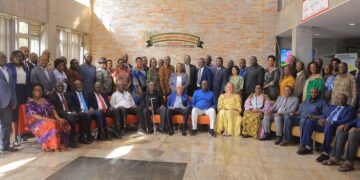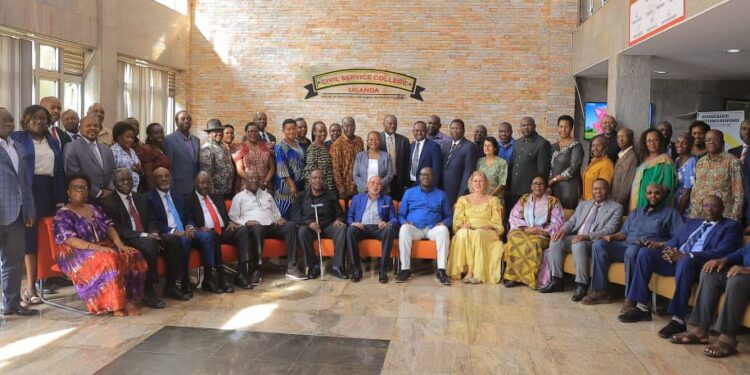Gen Odongo Jeje Abubakhar, Minister of Foreign Affairs, has urged Ugandan Ambassadors and Heads of Missions abroad to align the Ministry’s work with Uganda’s National Development framework, including Vision 2040 and the Third National Development Plan.
Speaking at the opening of the Ambassadors’ Conference running from August 26- 30, 2024, Gen Odongo emphasized the need for Uganda’s foreign policy to drive economic growth and regional integration.
The conference, held at the Civil Service College in Jinja, aims to achieve several objectives, including enhancing performance and innovation among missions, and facilitating peer-to-peer knowledge sharing.
The Ministry has adopted various interventions to achieve these objectives, including promoting regional and international peace and security, enhancing bilateral relations, and engaging with stakeholders.
“If Uganda’s Foreign Service delivers on the objectives of the different national priorities, programmes and objectives, we shall have played a very important historic role in the transformation of our country,” Gen Odongo said. “We must ensure that our foreign policy work contributes to the realization of our national development aspirations,” Gen. Odongo said.
The Minister highlighted economic and commercial diplomacy as key drivers of Uganda’s development, stressing the need for ambassadors to promote value addition, industrialization, and trade.
“Economic and commercial diplomacy has taken center stage in our foreign policy work,” he noted. “We must leverage our diplomatic presence abroad to attract investment, technology, and expertise that can drive Uganda’s economic transformation.”
He also stressed the importance of regional cooperation and integration, citing the East African Community and the African Continental Free Trade Area as key frameworks for promoting inter and intra-Africa trade.
“We believe, these are important and strategic pillars for Uganda’s national development,” Gen. Odongo said. “At the level of regional cooperation, the East African Community remains the main entity… For the rest of Africa, the African Continental Free Trade Area provides a framework for continent-wide trade cooperation.”
He also tackled the pressing challenges to regional peace and security, including the ongoing armed conflicts in the Democratic Republic of Congo and The Sudan, as well as the lingering political differences in South Sudan.
He underscored the imperative for Uganda to remain at the forefront of promoting peace and security in the region, leveraging its experience and influence to foster stability and cooperation.
“The situation in Somalia remains fragile in terms of peace, as the Al-Shabab is not entirely defeated,” the Minister noted.
“It is important that we pay close attention to the ATMIS draw-down, and whatever post-ATMIS transition arrangements will be put in place. Our interest, as a country that made the ultimate sacrifice for our brothers and sisters, is to ensure that the gains that have been made are not lost.”
On the issue of human rights and governance, Minister Abubakhar emphasized the need for sustained engagement and dialogue to address concerns and misconceptions.
“We need to have continuous engagement and dialogue to generate better appreciation on some of the situations causing discomfort to our partners,” he said, highlighting the importance of open communication in navigating complex issues and strengthening partnerships.
In his remarks, Foreign Affairs, Permanent Secretary Bagiire Vincent Waiswa highlighted the need for effective and efficient approaches to promote economic and commercial diplomacy, particularly in areas such as agro-industrialization, tourism promotion, mineral development, and science and technology (ATMs).
Bagiire re-echoed the importance of mobilizing Ugandans in the diaspora for national development, and promoting international law and commitments.
“We need to have a concerted effort to attract investors, eliminate non-tariff barriers, and enhance trade relations,” he said. “The Ministry has participated in coordinating and mobilizing grants for national development, including the Chinese Government grant of US$5.3 million to finance the MoFA Extension building project.”
Waiswa commended some Heads of Mission for heeding guidance on effective service delivery but expressed concern over others who have disregarded official guidance, leading to acrimonious situations.
“Leadership of a Mission is by the Head of Mission, but it’s impossible for them to succeed if they hold others in their team with little or no regard,” he said. “I urge you to always acquaint yourselves with the Public Finance Management Act (2015) as you seek to guide Accounting Officers about their duties.”
The Conference will also assess Mission performance and innovation, with awards for top performers.
- Latest











